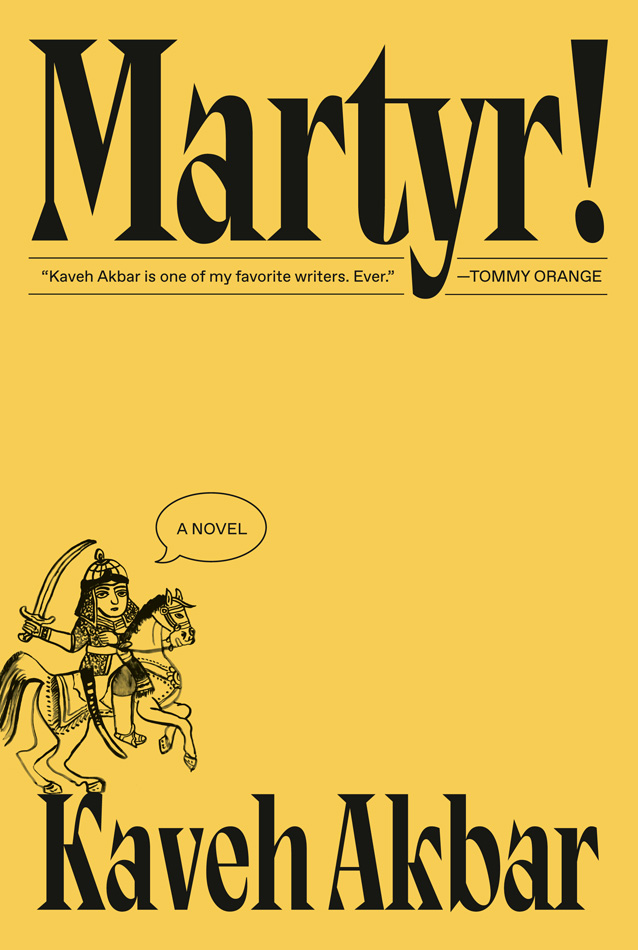Poet Kaveh Akbar’s debut novel, Martyr!, explores themes of addiction and sobriety, grief and grace, trauma and love. Rich with Daedalian prose, this semi-autobiographical bildungsroman tells the story of Cyrus Shams, a young Iranian American poet and recovering alcoholic.
Born in Iran but currently living in an Indiana college town, Cyrus is drifting, purposeless, and largely unattached. A couple of years into sobriety, he is struggling to learn how to live and write again. The high-highs and the low-lows mostly disappeared when he quit drinking, but the poet wrestles with understanding what remains, what meaning his life holds. His days are loosely constructed around a few people. He is removed from the world, mourning his isolation while also nursing it.
This apartness is rooted in his family history. Akbar weaves his own with Cyrus’ experiences to create an intricate tapestry of a narrative. Cyrus grew up in the U.S., with his father moving from Iran to escape the grief of losing his mother, who died when her flight to Dubai was accidentally shot down. As a novelist, Akbar skillfully fuses fiction with history, modeling this aspect of the story on the real-life tragedy of Iran Air Flight 655, a commercial airliner that was mistakenly attacked by the USS Vincennes in 1988. The book grapples with what it means, politically and personally, that this kind of tragedy can kill hundreds of people, leaving others—like Cyrus—forever traumatized, and yet be largely unremembered by many Americans.

The fictionalized version of this trauma is at the root of the questions that Cyrus chases through the pages of Martyr!: What makes a death—and, in turn, a life—meaningful and who gets to interpret that meaning. “My mom died for nothing… She had to share her death with three hundred other people,” Cyrus reflects. “My dad died anonymously after spending decades cleaning chicken shit on some corporate farm. I want my life—my death—to matter more than that.” And so Cyrus becomes obsessed with martyrdom, historically but also as a way of indulging his own thanatotic temptations.
Like the character he crafted in Cyrus, Akbar was born in Tehran and is a writer in recovery. Iranian American identity and addiction are central themes across his two collections of poetry and a chapbook titled Portrait of the Alcoholic. Some of the poems in these collections lay groundwork for Martyr!—anecdotes and phrasings repeated and reworked, the creative process of the writer re-shaping the stories of his life, rethinking the meanings that can be inferred on the page. A more abstracted version of this can also be seen in the zine (available at martyrzine.com) that Akbar made to accompany the novel.
For Cyrus, the shift in his status quo comes when he decides to write a book about martyrs as a way to pursue his interest and reinvigorate his own creative process. He soon embarks on a journey to meet Orkideh, a dying Persian artist, whose final exhibit is an Abramović-esque installation in which she talks to museumgoers about death. Enmeshed with Cyrus’ pilgrimage are stories told from the points of view of family and friends, as well as sections of Cyrus’ draft manuscript and dream sequences, including one in which Orkideh cuts off fingers to buy Bruegel’s “Landscape with the Fall of Icarus,” hinting at the sacrifices made for art, for poetry.
Through these structural elements, Akbar creates a dynamic experience of past and present while also setting up a Socratic dialogue of sorts, as the character’s contributions combine to explore the acts of care that give life meaning when we share and hold each other’s stories as modes of healing and love. There is inquiry into the roles people play, the performances we offer, even to those we care about, protecting them from ourselves—which is also to say, preventing the possibility for true connection.
In a flashback, Cyrus’s AA sponsor Gabe offers the advice, “Quit things in the order they’re killing you.” This is shared to help Cyrus address more serious addictions before attempting to quit smoking, but it also implies less visible dependencies on beliefs that can also kill us from within. Cyrus discovers that sobriety does not heal him but rather uncovers things he spent years dissociating from, mindsets that prove to be as difficult to kick as any substance. Substance use had been his core coping method, and Martyr! explores the ethics of self-pity, the narcissism of addiction, and what comes after. Cyrus begins to reexamine the beliefs he has held about the world and himself, to rebuild trust, and to share his life with others.
In this nimble debut, Akbar avoids the pitfalls of a hero’s journey in which a character ends up at sobriety, choosing instead to examine the opportunities for grace and transformation within a life of sobriety. He chronicles how Cyrus spends his time, how he finds redemption in his ongoing recovery process, and how he understands himself in the world. In the end, Cyrus’ quest leads him to an increased capacity for self-reflection, accountability, and love. He is no longer able to blame fate or family for his life’s ordeals, while neither wanting to let go of that life so easily nor hold it too close within himself.
If you or someone you know is experiencing substance use issues, Region Ten offers resources and support services that may be able to help. Learn more at regionten.org.
